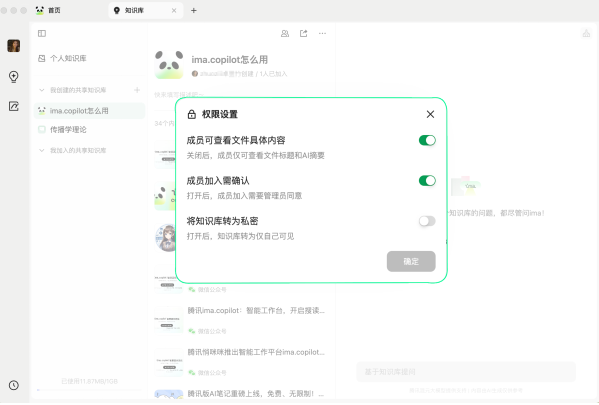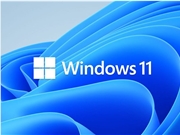On December 28, Tencent's AI smart workstation ima.copilot (hereinafter referred to as ima) upgraded its knowledge base, adding the capability of "shared knowledge base" and launching the "ima Knowledge Base" mini-program. Users can create a knowledge base in ima and share it for multiple users. The "ima Knowledge Base" mini-program not only connects to the desktop knowledge base but also supports directly importing files, sharing, or joining the knowledge base within WeChat. Users can conduct AI Q&A based on the knowledge base or the entire internet through the mini-program.
Shared Knowledge Base: Support for Creation, Sharing, and Joining
The ima "Knowledge Base" has added the "shared knowledge base" capability, allowing users to create multiple knowledge bases and share their created knowledge bases with others, inviting other members to join and use the knowledge base together.

After creating a knowledge base, users can invite up to 5 members as administrators to collaboratively build the content within the knowledge base. The created knowledge base can be shared, and visitors can engage in 3 rounds of Q&A. Once they join the knowledge base as members, they can conduct unlimited Q&A. Additionally, creators and administrators can set whether members can view the specific content of the files in the knowledge base, require approval from the creator or administrator before joining, and can set the knowledge base to private for personal visibility, greatly enhancing security.

For a team, as members use AI applications to enhance efficiency, each usage represents an independent AI output, making it challenging to achieve consistency and accuracy in information and output. Now, a shared knowledge base can be created in ima, turning it into a shared AI resource for the team, incorporating work-related documents such as Docs and PDFs, industry-related web pages or public articles, images taken during work, notes recorded in ima, and AI Q&A results generated from questions, ensuring that the output is more grounded in the team's accumulated knowledge and actual project situations. Furthermore, a designated person can manage and continuously update the content of the knowledge base. In addition to sharing team knowledge, the shared knowledge base can also be used to share professional knowledge from work, study, and life, such as industry report knowledge bases, exam preparation knowledge bases, visa strategy knowledge bases, and healthy recipe knowledge bases, among others.
Thus, the ima knowledge base not only serves as the user's "second brain" but can also become a "shared brain" among teams, making ima a "public workstation" for team collaboration.
“ima Knowledge Base” Mini-Program: Easier Information Storage and Sharing
With this upgrade, ima also launched the "ima Knowledge Base" mini-program, allowing users to log in and view previously created knowledge base content on PC, as well as import materials such as WeChat chat files and local photos into the knowledge base from their mobile devices. Users can also browse files, web pages, public accounts, favorites, and other content in WeChat, choosing to open them with "ima Knowledge Base" to quickly store them in their personal knowledge base.
In addition to creating their own knowledge bases, users can also share and join knowledge bases within the mini-program, and enter questions in the dialogue box at the bottom to conduct AI Q&A "based on the entire internet" or "based on the knowledge base." This means that for different questions, we can choose different knowledge bases for Q&A to obtain more precise, professional, and valuable answers.

The new ima is more flexible and convenient, allowing for the flexible import of mobile data into the knowledge base while leveraging mobile social platforms to let knowledge "flow." With the emergence of more vertical shared knowledge bases, AI will have the opportunity to deliver greater value, enhancing everyone's work efficiency and solving challenges in daily life.







